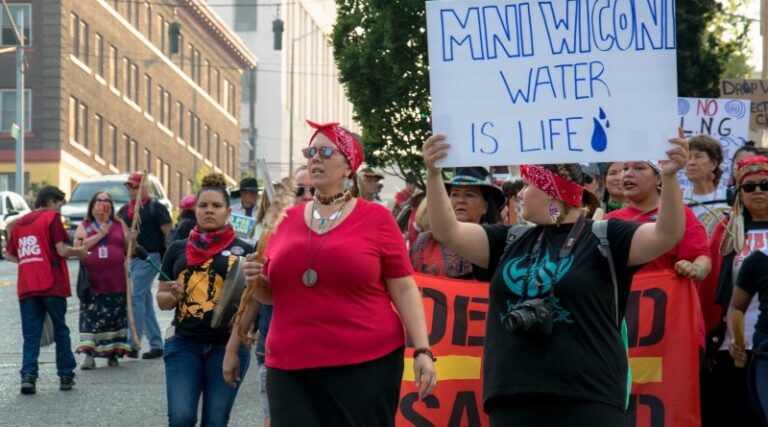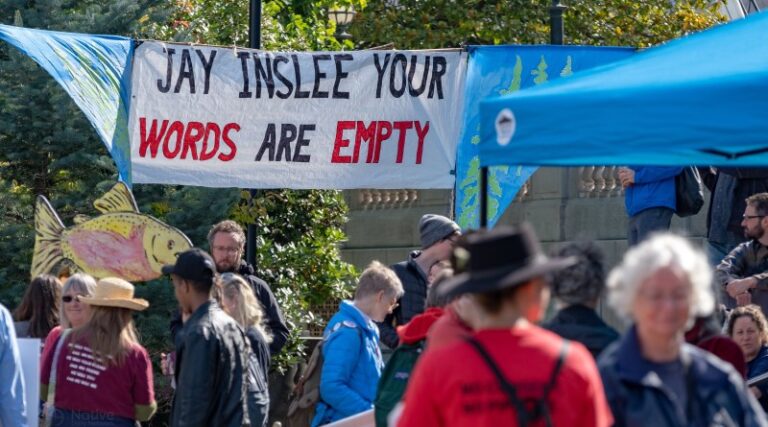by Frank Hopper
Juan Delgado had just dropped off a friend near the site of a No LNG rally in Tacoma last December when he saw a line of police dressed in riot gear emerge from behind a tanker truck. They wore black helmets with Plexiglas face shields, black body armor, and brandished two-foot-long black batons. Juan feared for his friend’s safety and for the safety of the 200 or so other water warriors there, many of whom he knew. He decided to pray.
Juan took his leather hand drum and approached a phalanx of bicycle cops who formed a blockade across East Alexander Avenue in front of Puget Sound Energy’s massive 8 million gallons liquified natural gas storage facility currently under construction on the Puyallup River tide flats. Behind the blockade of police bicycles, a line of cops in riot gear stood shoulder-to-shoulder like storm troopers.
Juan remembered seeing pictures a year earlier of police outside the Oceti Sakowin camp at Standing Rock in North Dakota assaulting No DAPL water protectors with water canons and plumes of pepper spray. His first instinct was to protect his friends the only way he knew how. He stood with them and increased their strength by one.
“I just knew I should support the people who take care of me,” he told NDN.
The police announced over a bullhorn they were going to begin making arrests. Juan saw a Native woman in front of him, Sarah Long of the Quinault tribe, get hauled off by police. Juan immediately moved to where Sarah had been and stood in her place. Drum in hand and a Native medallion around his neck, Juan was dressed for ceremony. His right hand quivered from Parkinson’s Disease and his bad back ached, but Juan was determined to stand his ground and not back down.
Juan prayed as the police grabbed him. They held his arms and pulled him back past the line of bicycles and into the same police car where Sarah had been placed. Now, four months after the December 18 action to block the gates of the construction site, a jury found Juan and Sarah not guilty of obstructing traffic and acquitted them of all charges.
Three Separate Trials Find Water Warriors Not Guilty
Juan and Sarah’s trial is the third in which water warriors were found not guilty of various misdemeanor charges for actions at No LNG rallies. Less than one week earlier, water warrior, Steve Way was found not guilty of trespassing on PSE property after he and 350 Seattle activist Carlo Voli locked themselves to a crane at the LNG plant construction site on December 11.
In an earlier trial, two elderly activists, Marilyn Kimmerling and Cynthia Linet were found not guilty of criminal trespass and obstructing an officer after locking themselves to construction equipment at the site on May 17. Four other activists were arrested that day, Sarah Morken, Irene Morrison, Jeff Johnston, and Jake Grote. All four accepted plea deals and did not take their cases to trial.
Steve Way Explains the Verdicts’ Significance
NDN caught up with Steve at the April 14 South Sound Climate Action Convention at the Tacoma Convention Center.
“They found me guilty of obstructing because I wouldn’t come down from the crane, but not guilty of trespassing on their property. That sends an amazing message,” Steve said in front of the booth he was manning on behalf of the environmental action group 350 Tacoma.
Steve explained although the LNG plant is not on land “legally” owned by the Puyallup Tribe, the tribe’s history with the Puyallup River estuary goes back thousands of years and forms the basis of their culture and identity.
“That way of looking at ownership is much stronger than any piece of paper,” Steve explained. “The LNG plant is like an atom bomb sitting in the center of their homeland. The Puyallup are simply protecting the estuary that’s been theirs for thousands of years.”
The jury seemed to agree. The Puyallup tribe’s claims on the land raised enough doubt it was impossible to find Steve guilty of trespassing.
The Power of an Elder’s Testimony
Of the three trials, the first two featured testimony by Puyallup tribal elder Ramona Bennett, the 79-year-old activist who was a leader in the fight for Native fishing rights in Washington state during the 1970s, a conflict commonly called the “fish wars.”
Ramona’s authority as a scholar and a leader during many pivotal fights for Native rights was evident during her testimony. She was not intimidated by the prosecutor’s frequent objections. She explained the many ways the government stole land from the tribe and how they created documents to make it “legal.” At one point, when asked where she got her knowledge she said, “From my elders. In our society we listen to our elders.”
Everyone stood when Ramona took the stand and then stood again when she stepped down. No one sat until she left the courtroom. The jury saw this display of respect. Many feel it influenced their decision.
Sarah Long Remembers Her Arrest
Sarah Long told NDN she responded to a call to action that went out before the December 18 “Block the Gates” rally. She drove up from Portland determined to put it all on the line and be arrested if necessary. So when police announced they were about to make arrests, she stepped forward and showed them she had no weapons.
A man working with the action’s organizers came up and told Sarah the elders had negotiated with the police and were now asking for everyone to move back. Sarah said, “That’s fine. I respect those elders. But my elders told me not to back down, so I’m not backing down.”
Within minutes she and fellow water warrior Juan Delgado found themselves together in the back of a police car headed for jail.
From Mom to Activist
Sarah initially worked to reform the city government in Portland where she now lives with her husband and two children. But she quickly became disillusioned with politics and yearned to do something more. That opportunity came when she heard of the Standing Rock Sioux Tribe’s fight against the Dakota Access Pipeline.
“Standing Rock was my first Native protest,” Sarah told NDN. “Then I very quickly learned about the history of Native activism. I was like, my goodness, here I am a visibly mixed-race person and I don’t even know the struggles my people and my relatives have been through.”
Sarah spent four months at Standing Rock. She returned to Portland and joined several Oregon tribes fighting against The Jordan Cove Project, a proposed 230-mile pipeline carrying fracked LNG to an export terminal in Coos Bay.
Her understanding of Climate Change and her determination to fight against it grew strong as she learned Native teachings. When the Puyallup called for help to block the gates at the LNG plant construction site last December, Sarah decided to join them and fight as her ancestors once fought, by putting it all on the line.
The Take Away of the Story
The Puyallup tribe’s fight against the LNG plant is not just about fossil fuels. It’s about the love of a people for our Grandmother the Earth. And when it comes right down to it, only that love has the power to save our planet from destruction.
So far, three separate juries have agreed.
Additional Information: Link to Ancestral Waters Documentary
First appearing on April 16, 2018, this article is part of an ongoing series documenting the Indigenous-led campaign against the Tacoma LNG facility.
The article has since been edited to remove time-sensitive elements, such as calls to action, in order to serve as an historical and educational resource. You can also explore other related articles and resources on the Ancestral Waters page for a more contextual understanding of the issues and events.
While the full “Ancestral Waters” documentary is available for screenings, we invite you to watch the trailer for a glimpse into the comprehensive story of resiliency and activism told in the film.




